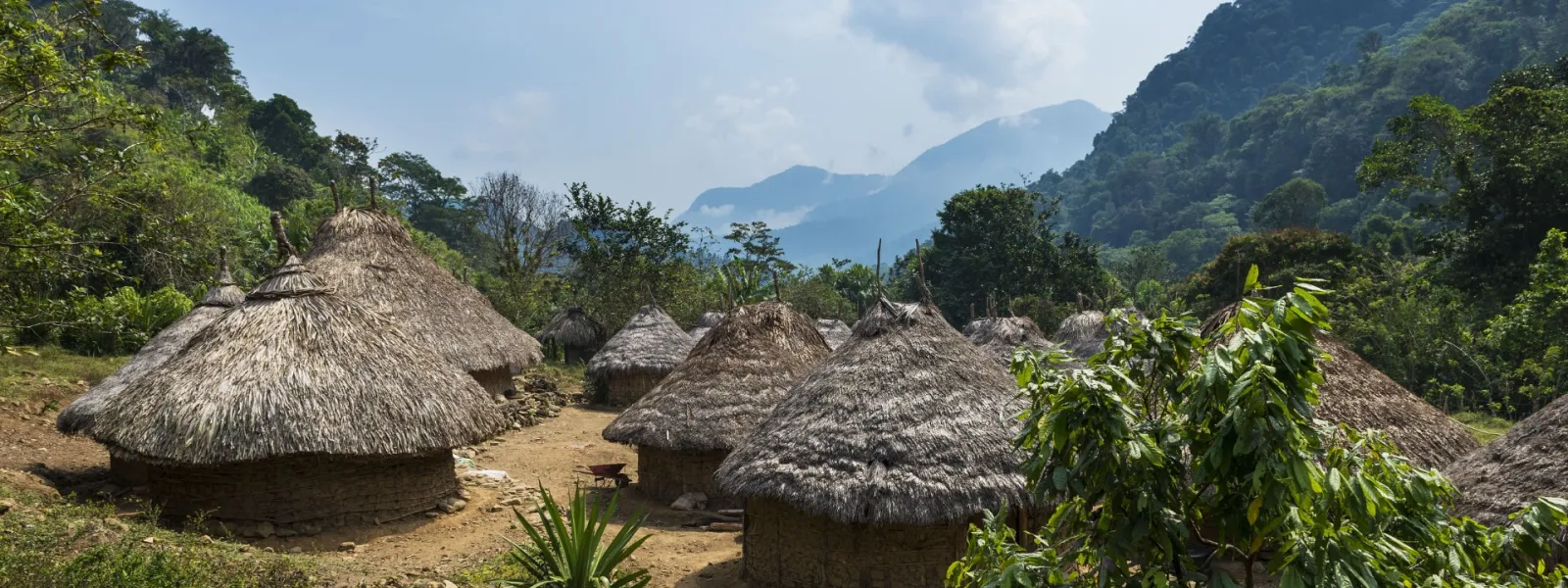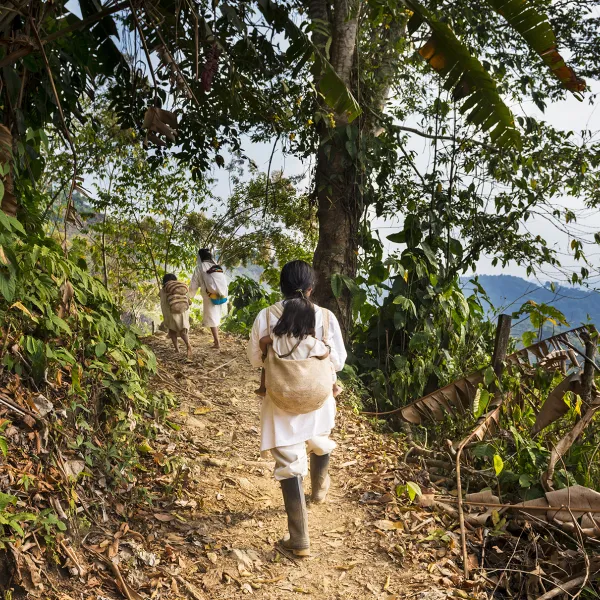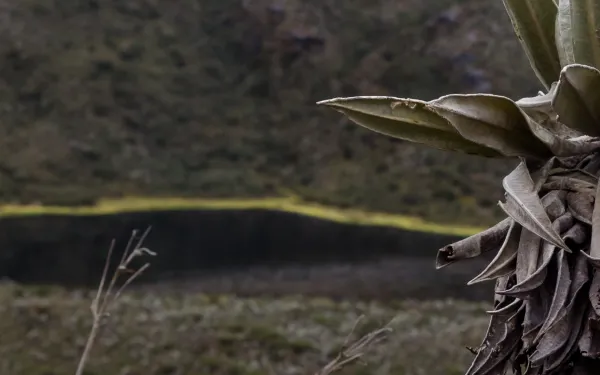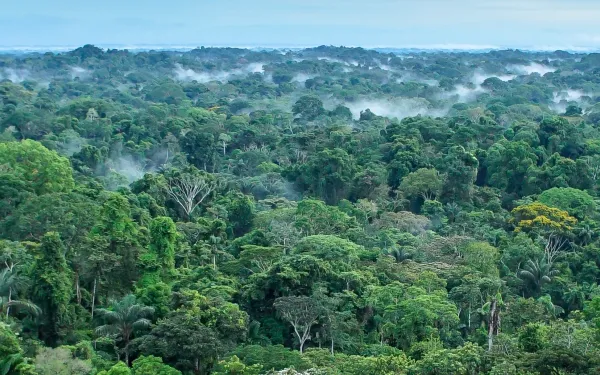
Project
Preserving the legacy of the Sierra Nevada de Santa Marta, Heart of the World
Rising abruptly from Colombia’s Caribbean coast, the Sierra Nevada de Santa Marta reaches 5,775 meters (18,946 ft.) at its highest points, the peaks of Bolívar and Colón. It is the highest coastal mountain system in the world, a place where indigenous knowledge and nature’s own wisdom converge.
The sheer changes in elevation create a wide variety of ecosystems within a small area, where the diversity of plant and animal life creates a unique exuberant region. The melting snows of the highest peaks form rivers and lakes, whose freshwater flows down steep slopes to the tropical sea at the base of the mountains.
The indigenous Arhuaco, Kogi, Wiwa, and Kankuamo people protect and care for this natural treasure with an authority they have inherited from their ancestors. According to their worldview the land is sacred and shared in divine communion between humans, animals, plants, rivers, mountains, and the spirts of their ancestors.
Despite this ancestral inheritance, development projects proposed for the region have failed to take the opinions of these indigenous groups into consideration. The Sierra Nevada de Santa Marta is currently threatened by 251 mineral concessions, hydroelectric projects, agriculture, urban sprawl, and infrastructure projects.
Many of these concessions were granted without the prior consultation of the indigenous communities, which represents a persistent and systematic violation of their rights.
Mining, which implies the contamination and erosion of watersheds, threatens the health of more than 30 rivers that flow out of the Sierra; these are the water sources of the departments of Magdalena, César, and La Guajira.
These threats have brought this natural paradise to the brink of no return. With it, would go the traditional lives of its indigenous inhabitants, who are dependent on the health of their land and the sacred sites it contains.
The Sierra hosts the archaeological site of la Ciudad Perdida, the Lost City, known as Teyuna, the cradle of Tayrona civilization. According to tradition, it is the source from which all nature was born—the living heart of the world.
The four guardian cultures of the Sierra are uninterested in allowing this natural and cultural legacy to disappear.

Related projects

Climate finance and a gender perspective: two concepts that must be intertwined
By Camila Bartelega, Florencia Ortúzar and Francisco Pinilla* Women and girls are disproportionately affected by the onslaught of the climate crisis. This is because they are usually the ones responsible for fetching water and food, and for taking care of children, the elderly, and the sick. Climate change makes this unpaid care work much more difficult. Evidence also shows that women and girls are more vulnerable to natural disasters. It's estimated that they're 14 times more likely to die than men when natural disasters strike. This may be because they are caring for vulnerable people, because they are often not taught how to swim or climb trees, or because they wear inadequate clothing to respond, amongst others. On the other hand, as the climate crisis creates chaos and increases conflict, they are more vulnerable to sexual assault and domestic violence. This is fueled by the growing frustration of a world in which resources are becoming scarcer and more difficult to obtain. It is clear, then, why it is important to include a gender perspective when talking about how best to address the climate crisis. But doing so is important not only to "level the playing field" for historically disadvantaged women, but also because they have a lot of knowledge to contribute, and the additional burdens they carry affect their ability to contribute to the best solutions. Including a gender perspective in climate action is therefore both fair and desirable for more effective and beneficial outcomes. If they are excluded, women lose, and we all lose. For Maite Smet, Executive Director of the International Analog Forestry Network, when we talk about a gender approach, or even a feminist approach, we are talking about issues of power. "Working from a gender and climate justice perspective is about wanting to change systems of power that have historically oppressed and socially excluded people," she said. "It opens up the possibility of including people who have not been part of important climate conversations and decisions." Now let's look at the relationship between gender and climate finance, a critical element in the uphill battle to preserve a livable planet. Gender and climate finance Tackling the global climate crisis will require transforming the way we live on the planet, including energy and food production, infrastructure and transportation. This will require significant financial resources. The Paris Accord stipulates that developed countries must provide financial assistance to the least developed and most vulnerable countries. This brings us to the world of climate finance: The provision of funds to implement mitigation and adaptation measures. All climate finance must have a gender perspective, as the impacts of the climate crisis disproportionately affect women and girls. What does this mean? It means funding that understands and intentionally addresses these differentiated impacts. It means that funding decisions are made with the participation of women, recognizing that they have valuable knowledge of their territories and are therefore the bearers of valuable solutions. Finally, it means making funding available and accessible to women. According to Natalia Daza, gender monitor of the Green Climate Fund for Latin America and the Caribbean and member of the Women Environment and Development Organization, the gender approach to climate finance has a lot to do with understanding that inequality shapes the way social relations take place. "Women are affected differently, usually more negatively, by the impacts of climate change,” she explained. “That's why civil society has a very important role to play in ensuring that climate action includes the voices of women, LGBTIQ+ and feminist organizations, from design to implementation.” The Gender Approach in the Green Climate Fund At AIDA, when we track climate finance coming into the region, we focus on the Green Climate Fund (GCF), the world's leading climate fund, which is accountable to the United Nations Framework Convention on Climate Change. Although far from perfect (not least because what is written is not necessarily followed), it is perhaps the most progressive fund on gender issues. The GCF's gender policy recognizes that climate change affects women and men differently and emphasizes the importance of women's participation and leadership in decision-making processes related to finance. It is considered progressive, compared to other funds, because of its cross-cutting approach, which seeks to integrate gender considerations into all aspects of financing. According to Seblewongel Deneke, the GCF’s gender specialist, any policy or strategy that emerges from the fund must take the gender perspective into account. "It is clear that both women and men contribute equally and should have equal opportunities. But we need to recognize that there are differentiated challenges for men and women, and that both are part of the solution." The policy includes capacity building, tools and materials. "The climate debate is not just about the climate agenda; it brings other elements of inequality to the table. We need to change access to education and health and ensure the basic rights that every individual should have, including women," Deneke said. What is needed? We cannot deny that we have made progress. The importance of the gender perspective in climate action and finance is discussed and recognized. There are policies to ensure it, institutions to implement it, and sometimes even staff and budgets to do so. But the job is not done. Women still have less access to climate finance and fewer positions of power. And mitigation and adaptation projects often fail to consider the disproportionate impact of climate change on women. It is not easy to change things when they move with the inertia of what has always been. But we cannot give up. At AIDA, we have integrated a gender perspective across all our work. In doing so, we have broken new ground on many fronts and improved our results, and not just for the benefit of women. As a regional node of GCF Watch, an international observatory that monitors the Green Climate Fund, AIDA is a bridge between decision-making at the Board level and the territories that receive the projects financed. Florencia Ortúzar, Senior Attorney at AIDA, says that it is not enough to have funds, there must also be adequate investments. "Civil society monitoring is key to ensure that investments in the name of climate are made with respect for human rights and with a gender focus, and to achieve the maximum potential of the funds allocated to these types of projects and programs." This was the theme of an in-person event held in Rio de Janeiro in June. Supported by the Global Alliance for Gender and Green Action (GAGGA) - and organized by CASA Socio-Environmental Fund, AIDA and Both Ends - the event aimed to train and motivate regional organizations with a feminist base to be better prepared to follow up on the Green Climate Fund. Lola Gutiérrez, director of the Bolivian Women's Fund, who attended the event, emphasizes the importance of learning more about the fund, other countries' experiences, and how to access these resources. "Women are affected in different ways by extractivism and climate change, and we are fundamental actors in the solution. It is important to be present and to problematize what is happening." One of the conclusions of the event was that with the progress in policies and with a narrative that is much more receptive to gender, we can stop being gatekeepers that prevent the passage of bad projects and become strikers that propose projects to be implemented to stop the climate crisis. Therein lies the hope that these grassroots organizations will soon be the ones accessing funds and proposing solutions. Only then can we celebrate and rest. * Camila Bartelega is a fellow with AIDA's Climate Program, Florencia Ortúzar is a senior attorney and Francisco Pinilla is a digital communications strategist.
Read more
Report of the International Mission to Colombia: Stop investor-state dispute settlement (ISDS)
In May 2023, a delegation of 13 representatives from social and environmental justice organisations from eight countries in the Americas and Europe visited Colombia to share experiences of struggles against the global investment protection regime. The mission also went to learn firsthand about the peoples and ecosystems being threatened by corporate lawsuits, as well as the environmental, social and cultural harms that transnational investments have already caused, particularly in the departments of La Guajira and Santander.The visit came in response to the significant rise in claims that transnational firms have made against the country in recent years, as highlighted in the Declaration “Recover Colombian Sovereignty in Defense of Water, Life and Territories”, signed by more than 280 organisations from 30 countries as well as 54 Colombian members of Congress. In the last five years, Colombia has faced some of the highest number of arbitration claims in Latin America. In 2018 alone, Colombia received more claims than any other country in the world.Colombia’s pending claims currently total US$13.2 billion – equivalent to 13% of the nation’s budget for 2023 and nearly equal to what Colombia plans to spend on education this year.According to the State National Agency for Legal Defense, as of March 2023, 14 arbitration processes were underway with eight more in the pre-arbitration stage. Colombia’s pending claims currently total US$13.2 billion (52 trillion Colombian pesos as of August 2023), although in three cases the amount claimed is not public. This is equivalent to 13% of the nation’s budget for 2023 and nearly equal to what Colombia plans to spend on education this year.The bulk of investors that have brought arbitration cases are involved in the extractive industries, especially mining.We witnessed how this system enables corporate impunity and threatens the realisation and defence of Colombians’ fundamental human and environmental rights. We also observed how this system interferes with judicial independence, environmental regulation, and national sovereignty. Read and download the report
Read more
Protecting Ecuador’s Yasuní National Park can bolster the global just energy transition
What the people of Ecuador decide in an August 20 referendum has the potential to not only slow oil exploitation in the Amazon, but also to generate a transformative impact at the national and international levels, recognizing the value of the key ecosystem for stabilizing the global climate and the need to transition to renewable and sustainable energy production. On August 20, in a popular consultation, the Ecuadorian people will have the opportunity to decide on a definitive halt to oil exploitation in a part of Yasuní National Park, one of the most biodiverse areas of the planet, located in the Amazon rainforest. The consultation seeks to stop oil extraction in the ITT block (Ishpingo, Tiputini, Tambococha), one of three in production within the park. Yasuní National Park is a UNESCO Biosphere Reserve. Multiple scientific studies have demonstrated its value in terms of biodiversity and its significance as the home to the Waorani people, and to the Tagaeri and Taromenane indigenous groups in voluntary isolation. The Amazon is an interconnected region shared by eight countries—Bolivia, Brazil, Colombia, Ecuador, Guyana, Peru, Suriname and Venezuela—and by French Guiana, a French overseas department, and what happens in one part of it affects the rest. Moreover, as a megadiverse region that serves as a global climate stabilizer, the importance of the Amazon rainforest is global. The eyes of the world will be watching to see if Ecuador chooses to protect its Amazonian territory, which would have a transformative impact not only in the country, but also across Latin America and the world. Protecting Yasuní would send a clear message that recognizes the ecological and social value of the Amazon to materialize the necessary energy transition and the protection of human rights. Javier Dávalos, AIDA's Climate Program Coordinator and Ecuadorian attorney, reflects: "After years of relentless struggle by social organizations and indigenous movements, Ecuador has the chance to make important progress in protecting an ecosystem that is key to adapting to and mitigating the global climate crisis, as well as to the survival of traditional and indigenous peoples, including those in voluntary isolation. To protect the climate for this and future generations, fossil fuel production must begin to decline immediately, and renewable energy production must be accelerated as part of a just transition. Ecuador can be a pioneer, leaving behind the environmental and social sacrifice zones promoted by the fossil fuel industry and showing the world how civil society can promote the just energy transition that the world needs. It can be an example of how to build energy alternatives based on guaranteeing human rights and the rights of nature, and how to effectively combat the triple crisis the world is facing: climate change, biodiversity loss and pollution." Context The initiative to put a definitive stop to oil exploitation in part of the Amazon is in line with the recommendations of the Intergovernmental Panel on Climate Change and the International Energy Agency that one-third to two-thirds of oil reserves be left in the ground in order to keep the increase in the average temperature of the planet below 2°C, compared to pre-industrial levels, and thus avoid catastrophic effects. The popular consultation in Ecuador takes place a few weeks after the UN Secretary General, Antonio Guterres, declared the beginning of the era of "climate boiling", pointing out the need for concrete changes to face the emergency and crisis caused by global warming. In addition, this consultation comes shortly after the conclusion of the Amazon Summit in Brazil, where the eight Amazonian countries discussed how to chart a sustainable path forward for the Amazon rainforest. "It is time to phase out fossil fuels to protect the Amazon," said Gustavo Petro, President of Colombia, who recently urged Amazonian countries and their partners in the Global North to commit to phasing out fossil fuel exploitation in order to protect the right to a just transition and accelerate the transition to a post-oil economy. press contact: Víctor Quintanilla (Mexico), AIDA, [email protected], +521 5570522107
Read more